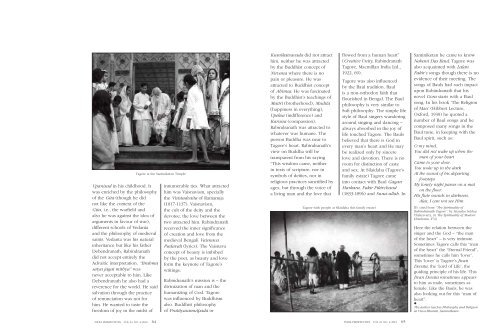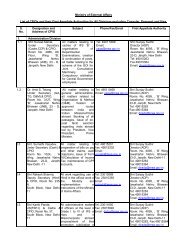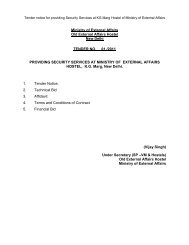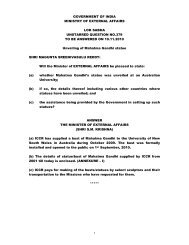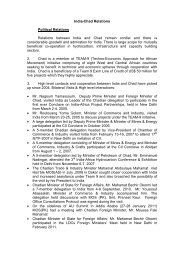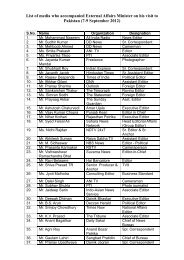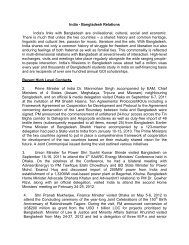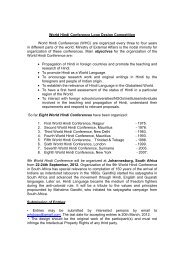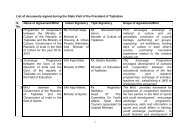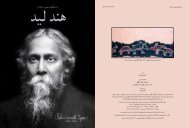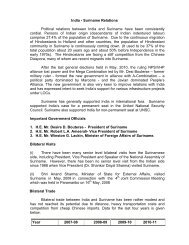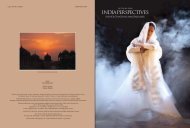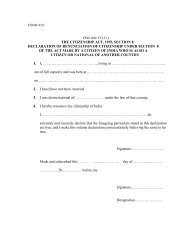IP_ Tagore Issue - Final.indd - high commission of india mauritius
IP_ Tagore Issue - Final.indd - high commission of india mauritius
IP_ Tagore Issue - Final.indd - high commission of india mauritius
You also want an ePaper? Increase the reach of your titles
YUMPU automatically turns print PDFs into web optimized ePapers that Google loves.
Upanisad in his childhood. Itwas enriched by the philosophy<strong>of</strong> the Gita (though he didnot like the context <strong>of</strong> theGita, i.e., the warfield andalso he was against the idea <strong>of</strong>arguments in favour <strong>of</strong> war),different schools <strong>of</strong> Vedantaand the philosophy <strong>of</strong> medievalsaints. Vedanta was his naturalinheritance but like his fatherDebendranath, Rabindranathdid not accept entirely theAdvaitic interpretation. “Brahmasatya jagat mithya” wasnever acceptable to him. LikeDebendranath he also had areverence for the world. He saidsalvation through the practice<strong>of</strong> renunciation was not forhim. He wanted to taste thefreedom <strong>of</strong> joy in the midst <strong>of</strong><strong>Tagore</strong> at the Santiniketan Templeinnumerable ties. What attractedhim was Vaisnavism, speciallythe Visistadvaita <strong>of</strong> Ramanuja(1017-1137). Vaisnavism,the cult <strong>of</strong> the deity and thedevotee, the love between thetwo attracted him. Rabindranathreceived the inner significance<strong>of</strong> creation and love from themedieval Bengali VaisnavaPadavali (lyrics). The Vaisnavaconcept <strong>of</strong> beauty is imbibedby the poet, as beauty and loveform the keynote <strong>of</strong> <strong>Tagore</strong>’swritings.Rabindranath’s mission is – thedivinization <strong>of</strong> man and thehumanizing <strong>of</strong> God. <strong>Tagore</strong>was influenced by Buddhismalso. Buddhist philosophy<strong>of</strong> Pratityasamutpada orKsanikatvavada did not attracthim, neither he was attractedby the Buddhist concept <strong>of</strong>Nirvana where there is nopain or pleasure. He wasattracted to Buddhist concept<strong>of</strong> Ahimsa. He was fascinatedby the Buddhist’s teachings <strong>of</strong>Maitri (brotherhood), Mudita(happiness in everything),Upeksa (indifference) andKaruna (compassion).Rabindranath was attracted towhatever was humane. Theperson Buddha was near to<strong>Tagore</strong>’s heart. Rabindranath’sview on Buddha will betransparent from his saying“This wisdom came, neitherin texts <strong>of</strong> scripture, nor insymbols <strong>of</strong> deities, nor inreligious practices sanctified byages, but through the voice <strong>of</strong>a living man and the love thatflowed from a human heart”(Creative Unity, Rabindranath<strong>Tagore</strong>, Macmillan India Ltd.,1922, 69).<strong>Tagore</strong> was also influencedby the Baul tradition. Baulis a non-orthodox faith thatflourished in Bengal. The Baulphilosophy is very similar toSufi philosophy. The simple lifestyle <strong>of</strong> Baul singers wanderingaround singing and dancing –always absorbed in the joy <strong>of</strong>life touched <strong>Tagore</strong>. The Baulsbelieved that there is God inevery man’s heart and He maybe realized only by sincerelove and devotion. There is noroom for distinction <strong>of</strong> casteand sex. At Silaidaha (<strong>Tagore</strong>’sfamily estate) <strong>Tagore</strong> cameinto contact with Baul GaganHarkara, Fakir Fikirchand(1833-1896) and Suna-ullah. In<strong>Tagore</strong> with people at Silaidaha (his family estate)Santiniketan he came to knowNabani Das Baul. <strong>Tagore</strong> wasalso acquainted with LalanFakir’s songs though there is noevidence <strong>of</strong> their meeting. Thesongs <strong>of</strong> Bauls had such impactupon Rabindranath that hisnovel Gora starts with a Baulsong. In his book ‘The Religion<strong>of</strong> Man’ (Hibbert Lecture,Oxford, 1930) he quoted anumber <strong>of</strong> Baul songs and hecomposed many songs in theBaul tune, in keeping with theBaul spirit, such as:O my mind,You did not wake up when theman <strong>of</strong> your heartCame to your door.You woke up in the darkAt the sound <strong>of</strong> his departingfootstepsMy lonely night passes on a maton the floor.His flute sounds in darkness,Alas, I can not see Him.[Tr. cited from “The Spirituality <strong>of</strong>Rabindranath <strong>Tagore</strong>”, by Sitanshu SekharChakravarty, in The Spirituality <strong>of</strong> ModernHinduism, 274]Here the relation between thesinger and the God – “the man<strong>of</strong> the heart” – is very intimate.Sometimes <strong>Tagore</strong> calls this “man<strong>of</strong> the heart” the “Eternal Friend”,sometimes he calls him ‘lover’.This ‘lover’ is <strong>Tagore</strong>’s JivanDevata, the ‘Lord <strong>of</strong> Life’, theguiding principle <strong>of</strong> his life. ThisJivan Devata sometimes appearsto him as male, sometimes asfemale. Like the Bauls, he wasalso looking out for this “man <strong>of</strong>heart”.◆The author teaches Philosophy and Religionat Visva-Bharati, Santiniketan.INDIA PERSPECTIVES VOL 24 NO. 2/2010 64 INDIA PERSPECTIVES VOL 24 NO. 2/2010 65


